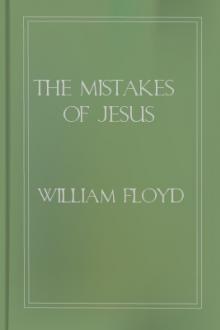The Sense of Beauty, George Santayana [e ink epub reader .txt] 📗

- Author: George Santayana
- Performer: -
Book online «The Sense of Beauty, George Santayana [e ink epub reader .txt] 📗». Author George Santayana
We find here, at the very threshold of our subject, a clear instance of a conflict of principles which appears everywhere in aesthetics, and is the source and explanation of many conflicts of taste. Since a note is heard when a set of regular vibrations can be discriminated in the chaos of sound, it appears that the perception and value of this artistic element depends on abstraction, on the omission from the field of attention, of all the elements which do not conform to a simple law. This may be called the principle of purity. But if it were, the only principle at work, there would be no music more beautiful than the tone of a tuning-fork. Such sounds, although delightful perhaps to a child, are soon tedious. The principle of purity must make some compromise with another principle, which we may call that of interest. The object must have enough variety and expression to hold our attention for a while, and to stir our nature widely.
As we are more acutely sensitive to results or to processes, we find the most agreeable effect nearer to one or to the other of these extremes of a tedious beauty or of an unbeautiful expressiveness. But these principles, as is clear, are not coordinate. The child who enjoys his rattle or his trumpet has aesthetic enjoyment, of however rude a kind; but the master of technique who should give a performance wholly without sensuous charm would be a gymnast and not a musician, and the author whose novels and poems should be merely expressive, and interesting only by their meaning and moral, would be a writer of history or philosophy, but not an artist. The principle of purity is therefore essential to aesthetic effect, but the principle of interest is subsidiary, and if appealed to alone would fail to produce beauty.
The distinction, however, is not absolute: for the simple sensation is itself interesting, and the complication, if it is appreciable by sense and does not require discursive thought to grasp it, is itself beautiful. There may be a work of art in which the sensuous materials are not pleasing, as a discourse without euphony, if the structure and expression give delight; and there may be an interesting object without perceived structure, like musical notes, or the blue sky. Perfection would, of course, lie in the union of elements all intrinsically beautiful, in forms also intrinsically so; but where this is impossible, different natures prefer to sacrifice one or the other advantage.
Colour.
§ 17. In the eye we have an organ so differentiated that it is sensitive to a much more subtle influence than even that of air waves. There seems to be, in the interstellar spaces, some pervasive fluid, for the light of the remotest star is rapidly conveyed to us, and we can hardly understand how this radiation of light, which takes place beyond our atmosphere, could be realized without some medium. This hypothetical medium we call the ether. It is capable of very rapid vibrations, which are propagated in all directions, like the waves of sound, only much more quickly. Many common observations, such as the apparent interval between lightning and thunder, make us aware of the quicker motion of light. Now, since nature was filled with this responsive fluid, which propagated to all distances vibrations originating at any point, and moreover as these vibrations, when intercepted by a solid body, were reflected wholly or in part, it obviously became very advantageous to every animal to develope an organ sensitive to these vibrations — sensitive, that is, to light. For this would give the mind instantaneous impressions dependent upon the presence and nature of distant objects.
To this circumstance we must attribute the primacy of sight in our perception, a primacy that makes light the natural symbol of knowledge. When the time came for our intelligence to take the great metaphysical leap, and conceive its content as permanent and independent, or, in other words, to imagine things, the idea of these things had to be constructed out of the materials already present to the mind. But the fittest material for such construction was that furnished by the eye, since it is the eye that brings us into widest relations with our actual environment, and gives us the quickest warning of approaching impressions. Sight has a prophetic function. We are less interested in it for itself than for the suggestion it brings of what may follow after. Sight is a method of presenting psychically what is practically absent; and as the essence of the thing is its existence in our absence, the thing is spontaneously conceived in terms of sight.
Sight is, therefore, perception par excellence, since we become most easily aware of objects through visual agency and in visual terms. Now, as the values of perception are those we call aesthetic, and there could be no beauty if there was no conception of independent objects, we may expect to find beauty derived mainly from the pleasures of sight. And, in fact, form, which is almost a synonym of beauty, is for us usually something visible: it is a synthesis of the seen. But prior to the effect of form, which arises in the constructive imagination, comes the effect of colour; this is purely sensuous, and no better intrinsically than the effects of any other sense: but being more involved in the perception of objects than are the rest, it becomes more readily an element of beauty.
The values of colours differ appreciably and have analogy to the differing values of other sensations. As sweet or pungent smells, as high and low notes, or major and minor chords, differ from each other by virtue of their different stimulation of the senses, so also red differs from green, and green from violet. There is a nervous process for each, and consequently a specific value. This emotional quality has affinity to the emotional quality of other sensations; we need not be surprised that the high rate of vibration which yields a sharp note to the ear should involve somewhat the same feeling that is produced by the high rate of vibration which, to the eye, yields a violet colour. These affinities escape many minds; but it is conceivable that the sense of them should be improved by accident or training. There are certain effects of colour which give all men pleasure, and others which jar, almost like a musical discord. A more general development of this sensibility would make possible a new abstract art, an art that should deal with colours as music does with sound.
We have not studied these effects, however, with enough attention, we have not allowed them to penetrate enough into the soul, to think them very significant. The stimulation of fireworks, or of kaleidoscopic effects, seems to us trivial. But everything which has a varied content has a potentiality of form and also of meaning. The form will be enjoyed as soon as attention accustoms us to discriminate and recognize its variations; and meaning will accrue to it, when the various emotional values of these forms ally the new object to all other experiences which involve similar emotions, and thus give it a sympathetic environment in the mind. The colours of the sunset have a brilliancy that attracts attention, and a softness and illusiveness that enchant the eye; while the many associations of the evening and of heaven gather about this kindred charm and deepen it. Thus the most sensuous of beauties can be full of sentimental suggestion. In stained glass, also, we have an example of masses of colour made to exert their powerful direct influence, to intensify an emotion eventually to be attached to very ideal objects; what is in itself a gorgeous and unmeaning ornament, by its absolute impressiveness becomes a vivid symbol of those other ultimates which have a similar power over the soul.
Materials surveyed.
§ 18. We have now gone over those organs of perception that give us the materials out of which we construct objects, and mentioned the most conspicuous pleasures which, as they arise from those organs, are easily merged in the ideas furnished by the same. We have also noticed that these ideas, conspicuous as they are in our developed and operating consciousness, are not so much factors in our thought, independent contributors to it, as they are discriminations and excisions in its content, which, after they are all made, leave still a background of vital feeling. For the outer senses are but a portion of our sensorium, and the ideas of each, or of all together, but a portion of our consciousness.
The pleasures which accompany ideation we have also found to be unitary and vital; only just as for practical purposes it is necessary to abstract and discriminate the contribution of one sense from that of another, and thus to become aware of particular and definable impressions, so it is natural that the diffused emotional tone of the body should also be divided, and a certain modicum of pleasure or pain should be attributed to each idea. Our pleasures are thus described as the pleasures of touch, taste, smell, hearing, and sight, and may become elements of beauty at the same time as the ideas to, which they are attached become elements of objects. There is, however, a remainder of emotion as there is a remainder of sensation; and the importance of this remainder — of the continuum in which lie all particular pleasures and pains — was insisted upon in the beginning.
The beauty of the world, indeed, cannot be attributed wholly or mainly to pleasures thus attached to abstracted sensations. It is only the beauty of the materials of things which is drawn from the pleasures of sensation. By far the most important effects are not attributable to these materials, but to their arrangement and their ideal relations. We have yet to study those processes of our mind by which this arrangement and these relations are conceived; and the pleasures which we can attach to these processes may then be added to the pleasures attached to sense as further and more subtle elements of beauty.
But before passing to the consideration of this more intricate subject, we may note that however subordinate the beauty may be which a garment, a building, or a poem derives from its sensuous material, yet the presence of this sensuous material is indispensable. Form cannot be the form of nothing. If, then, in finding or creating beauty, we ignore the materials of things, and attend only to their form, we miss an ever-present opportunity to heighten our effects. For whatever delight the form may bring, the material might have given delight already, and so much would have been gained towards the value of the total result.
Sensuous beauty is not the greatest or most important element of effect, but it is the most primitive and fundamental, and the most universal. There is no effect of form which an effect of material could not enhance, and this effect of material, underlying that of form, raises the latter to a higher power and gives the beauty of the object a certain poignancy, thoroughness, and infinity which it otherwise would have lacked. The Parthenon not in marble, the king's crown not of gold, and the stars not of fire, would be feeble and prosaic things. The greater hold which material beauty has upon the senses, stimulates us here, where the form is also sublime, and lifts and intensifies our emotions. We need this stimulus if our perceptions are to reach the highest pitch of strength and acuteness. Nothing can be ravishing that





Comments (0)